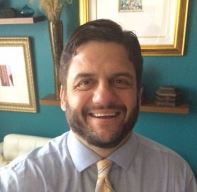Hope and Help
Today’s post was written by Bert E. Thomas IV, PhD, MBA, CEO of the Sarcoma Foundation of America.

Hope and Help is my patient advocacy motto.
I believe that one can characterize patient advocacy efforts into two buckets: activities focused on Hope and activities focused on Help. Hope for finding a cure and Help with the patient journey. Historically patients had the smallest voice in terms of advocacy, but that is not the case anymore. The accomplishment of the patient advocacy community in raising the impact and importance of the patient voice is a testament to how a group of people speaking with one voice can change the world for the better. Patients, and those who advocate for them, are leading the charge to find both the Hope and the Help that they so desperately need in their patient journey.
Patient advocates take on many roles in support of their community. These activities range from giving voice to the patient perspective in policy discussions to raising disease awareness with the public, to helping to educate patients and caregivers about their disease. And while advocacy in the policy space, particularly regarding federal medical research funding or drug development policies, is of the utmost importance, the Sarcoma Foundation of America (SFA) believes that patients need to be given the tools to be advocates for themselves during their treatment.
A large part of this is the belief that an educated patient is an empowered patient – one that understands their disease, the latest advancements in treatment options, and the direction of current sarcoma research. This foundation of knowledge can serve to provide both Hope and Help to patients and their families during their journey with sarcoma.
To help patients with this quest for knowledge, the SFA is expanding our series of patient education conferences called “Ask the Expert.” These patient education events bring together key stakeholders in the sarcoma community ranging from patients, survivors, caregivers, and expert doctors, to discuss the leading treatments and developments in sarcoma research and how they can potentially affect treatment paradigms. The educational conferences represent an opportunity for the patient community to gain insight in their disease and ask questions to leading sarcoma researchers and doctors. Topic areas may include Developments in Research, Clinical Trials, Medications and Treatments, Immunotherapy, Pediatrics, and more.
There are currently six conferences scheduled for 2016:
Raleigh-Durham, NC — September 10, 2016
New York, NY — September 12, 2016
Pittsburgh, PA — September 17, 2016
Miami, FL — September 24, 2016
Salt Lake City, UT – October 15, 2016
Chicago, IL — October 25, 2016
More information can be found at https://www.curesarcoma.org/education/sarcoma-education-conferences/.
All of us at the SFA sincerely hope that these conferences will make a difference to patients and provide some of the tools and information needed to be an educated, empowered patient. This is just one way that we aim to provide both Hope and Help to the sarcoma community.

